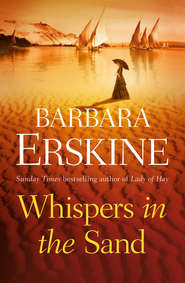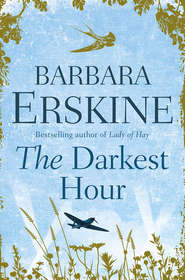По всем вопросам обращайтесь на: info@litportal.ru
(©) 2003-2024.
✖
The Ghost Tree: Gripping historical fiction from the Sunday Times Bestseller
Автор
Год написания книги
2019
Настройки чтения
Размер шрифта
Высота строк
Поля
‘Do you want me to tell him?’
‘No!’ Ruth was shocked. ‘No, of course not.’ She took a deep breath. ‘I’ll do it tomorrow after you’ve gone.’ She frequently found herself resenting Harriet’s calm assumption that she was the more efficient of the two of them, but it wasn’t as if they saw each other often enough these days to make an issue of something so trivial.
‘So, what will you do after you’ve got rid of him?’ For all their closeness there had been long gaps when they hadn’t seen each other, especially since Harriet had moved away from London and down to the West Country. She surveyed her friend fondly. Ruth had large grey eyes, her most striking feature; as a child they had always been the first thing people mentioned about her. Her hair on the other hand was a light golden brown, something she had never bothered about and which had become streaked with silver at the temples at a remarkably early age. It had suited her then and suited her now. Harriet had always felt strangely protective of Ruth. She was one of those people who seemed too vulnerable to exist in the normal world; which was rubbish. At some level Ruth was tough as old boots.
‘I haven’t any plans yet. I’m not sorry I gave up teaching; I’d been there too long and I was growing stale. I was just learning to appreciate my freedom as mistress of my own destiny when I found out Dad was so ill and I thought I’d have to move up here permanently to look after him.’ Ruth sighed sadly. ‘No more freedom after all. That was why I rented out my London flat. I didn’t realise how short a time he had left.’
‘And what of the husband?’ Harriet never stooped to giving Richard his name.
Ruth laughed quietly. ‘The ex-husband is fine. You saw him at the funeral. We agreed to go our own ways. We still talk occasionally. We’re friends.’
There was a painful pause, a silence that covered so much that had happened: her longing for a child and the bleak discovery that Rick was unlikely ever to father a baby, the failed IVF, the decision to give up trying, the sense of empty pointlessness that followed.
Harriet cleared her throat uncomfortably. ‘So, you really are fancy-free?’
‘I suppose so.’
‘With no London flat, at least for now, but instead an Edinburgh house.’
‘Yup.’
‘Any gorgeous men on the horizon?’
‘No.’
‘Not Timothy?’
‘Definitely not Timothy.’
‘So, what did you do with yourself those last few months before you came up here? If you weren’t working, you must have been doing something.’
‘Living off my share of the sale of Rick’s and my house. I bought the flat with my half and that left me some change to give me the chance to stop and think about what I really want to do with the rest of my life. Meanwhile, I was free to read the books I want to read instead of set texts; explore the world, relax; take up hobbies for the first time since I grew up!’
‘Stamp collecting?’ Harriet’s voice was dry, though there was a twinkle in her eye.
Ruth laughed. ‘If you must know, I’ve started researching my family tree. My mother’s family tree, to be exact.’
‘Bloody hell, Ruth! I thought your father’s attitude to your ancestors would have put you off that for life.’
Ruth grimaced. ‘On the contrary. I always planned to do it one day, if only to show him I didn’t care how much he hated them. Besides, I want to find a family, any family. Dad was my last living relative.’ There was a long pause. ‘So,’ she changed the subject abruptly, ‘enough of that. Let’s talk about you. You haven’t told me what you’ve been up to.’
‘I’m still writing.’ Harriet leaned forward, as always intense, her short red hair framing a face focused with sudden excitement. She hesitated momentarily then went on. ‘I’m just starting a book about the vital role of women in the Second World War. Code-breakers, SOE – the specially-trained people who went overseas as spies and saboteurs – pilots, that sort of thing, telling the story of one particular woman from each category. I’ve arranged to go and stay with some friends in North Berwick while I’m up here. Liz and Pete Fleming. Liz discovered that her grandmother worked for SOE. She was dropped behind enemy lines and worked undercover near Paris. Can you imagine how brave you had to be to do that? So I’m writing a chapter about her.’ Her eyes were sparkling. ‘Another of my subjects is a woman called Dion Fortune who lived in Glastonbury.’ Harriet lived in a cottage in the famously eccentric Somerset town. It was there she had already written several well-received popular biographies. ‘Dion was a famous occultist. She lived at the foot of the Tor and conducted séances and meditations there. During the war, and this is the fascinating bit, she organised her followers to fight Hitler with magical energies and imagined armies of Arthurian knights with swords. You did know Hitler was into the occult?’
‘I think I’d heard, yes.’ Ruth was looking bemused.
‘Comparatively few people have heard of Dion these days, but that’s the point. These are unsung heroines and she’s probably the oddest of them all.’
‘Magic was my mother’s thing,’ Ruth put in wistfully. ‘She’d have loved Glastonbury. She used to go to crystal shops and buy incense and pretty stones. She kept them in a bag to calm her nerves; she used to meditate. Dad hated her interest in all that stuff. I can still remember the row they had when he caught her looking at them. She tried to stand up for herself, but he sulked like a spoilt child if she tried to defy him and as far as I know she gave it all up.’ Her face clouded as she remembered. ‘To him, meditation and prayer were pointless at best and childish superstition at worst.’
Intellectually she understood why her father had hated religion, or, his second relentless dislike, anything or anyone whom he regarded as posh, but what she had never been able to forgive was the way he had taken his resentments on both counts out on his own wife.
Presumably it was an instinctive sense of self-defence as she was growing up that preserved Ruth from any interest in history or religion; she left home as soon as she finished school, first to study English literature at Cambridge University, then to learn to teach, then to take up a series of posts teaching English. She had even married an English teacher.
She and Rick supported each other through the heartbreaks and trials that beset the marriage, but something in their relationship died with their hopes of a family. They began to drift apart and it was just after their tenth wedding anniversary that Ruth had rebelled and ended both marriage and career.
‘There was a lot about your mother that your dad didn’t like, wasn’t there,’ Harriet said cautiously. ‘Even when we were at school. I remember you telling me about her aristocratic ancestors.’
‘And those he hated above all. Poor Mummy. I’m not sure why he ever married her, but they were happy as long as she toed the official line.’ Ruth paused. ‘I suspect he didn’t realise when he first met her how well connected the family was, but as soon as he did all his left-wing prejudices kicked in with a vengeance. He found her stories intensely embarrassing. It would have destroyed his street cred if his Marxist pals had found out.’
Harriet smiled. ‘But she didn’t have a title or anything?’
‘Good lord, no. We’re talking generations back; hundreds of years even. The blue blood had worn extremely thin by the time it reached Mummy and, in me, well, it’s virtually non-existent! No more than the occasional effete gene.’ Ruth laughed. ‘But back in the eighteenth century one of my great-great-great-great-great-grandfathers,’ she was counting on her fingers, ‘a chap called Thomas Erskine, was Lord Chancellor of England. It sounded incredibly grand and impressive and sort of out of a fairy tale – what?’
Harriet had let out a strangled squeak. ‘Lord Erskine was one of Dion’s spirit guides!’
‘I beg your pardon?’
‘You wouldn’t credit it, would you! What a coincidence!’ Harriet gave a gurgle of delight. ‘I knew I’d come across the name somewhere, but I’d forgotten it was you who had told me about him. A neighbour of mine lent me a book about Dion to read on the train and start filling in some background for my next chapter, and it mentions him! Those séances I told you about? Various exotic people like Confucius came to instruct her in the esoteric arts when she was at the start of her career as an occultist, and Lord E, as she called him, was one of them!’
Ruth gazed at her, bemused. ‘Why? How?’
‘I’ve no idea. In fact, you can tell me when you’ve done your family research! I’ll leave the book with you when I go and you can read it yourself. It’s a bit intense, to be honest, downright incomprehensible at times, but I love all this mystical stuff! I suppose I couldn’t live in Glasto and not know a bit about it. I’ve friends who are deeply involved in it all. Did your mother ever mention that he had a spooky side?’
‘No.’ Ruth was still staring at her in disbelief. ‘When I was old enough to learn what discretion was and realised what a difficult man my father could be and that I could be trusted to keep quiet, Mummy did tell me stories about them all and I loved listening to them. They were everything our lives at home weren’t. Romantic and exotic and part of history, but not spooky, no. Far from it.’ She gave Harriet a tolerant smile. ‘What I liked was that they all had huge families and, unlike Dad, seem to have been so proud of where they came from. Hence my new hobby. I want to find out about them. And being in Edinburgh is perfect because that was where the story started.’
‘And you’re not afraid your father’s ghost will haunt you if you do this?’ Harriet looked at her quizzically.
‘If he does,’ Ruth retorted firmly, ‘I shall have a stern word! I’m doing this for Mummy as much as me. She would have loved it.’
3 (#u9320a8f9-f8fa-5911-b5c5-a3f41d6e7018)
Sitting opposite Timothy Bradford at the kitchen table, Ruth found herself studying his face for the first time. He had pale pimply skin and mouse-coloured hair. When standing up he was the same height as she was but he had slumped into the chair and was leaning back, looking up at her, his expression guarded. He obviously resented her knock on his bedroom door and the invitation down to the kitchen.
She had seen Harriet off on the train at Waverley a couple of hours before and walked slowly back towards her father’s house in quiet, refined Morningside, in the south-west of the city. A lively autumn wind had risen and caught her hair as she crossed the Meadows, the area of parkland lying between the city and her destination, the leaves flying in clouds from the trees. As she neared Number 26 her pace had slowed. She was not anxious to see Timothy again but, if he was at home, this was the time to face him.
‘I wanted to thank you for looking after my dad,’ she began. ‘It was really good of you. I’m sorry it took me so long to find out he was ill.’ She paused, hoping he would acknowledge the fact that he could have made the effort to contact her, but he ignored the remark. He was watching her through narrowed eyes.
‘So, when are you going back to London?’
His question threw her completely. This was her line.
‘I’m staying here,’ she replied after the smallest of hesitations. ‘There’s a lot to sort out. So, I was going to ask you if you could let me know when you’re planning on leaving.’
She saw a flash of something in his eyes. Anger? Shock? Indignation? She wasn’t sure what it was, but it was immediately hidden, to be replaced by his previous bland stare. ‘I hadn’t planned on leaving, Ruth. Your father made it clear that this was my home as long as I wanted to stay here. He told me I was the son he had always wanted.’
In the end, with very bad grace, he agreed to move by the Thursday. The implication in his grudging acceptance of her request after she had threatened to go to her father’s solicitor, was that it would only be a matter of time before he returned.
As a house guest, he was for those last few days exemplary. He was neat, tidy and quiet. She barely saw him. She never met him in the kitchen or on the stairs. She wouldn’t have known he was still there at all had he not from time to time played his radio very softly in the evenings upstairs. Her father had given him the use of the two small rooms on the top floor and the guest bathroom which sat below it on the half landing. Once or twice she had tiptoed up when she knew he was out and tried the doors. Both were locked.











